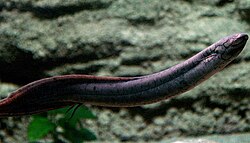ミナミアメリカハイギョ
ミナミアメリカハイギョ (学名:Lepidosiren paradoxa、レピドシレン・パラドクサ)は、ハイギョ目ミナミアメリカハイギョ科の魚。
| ミナミアメリカハイギョ | |||||||||||||||||||||||||||
|---|---|---|---|---|---|---|---|---|---|---|---|---|---|---|---|---|---|---|---|---|---|---|---|---|---|---|---|

| |||||||||||||||||||||||||||
| 保全状況評価[2] | |||||||||||||||||||||||||||
| LEAST CONCERN (IUCN Red List Ver.3.1 (2001)) 
| |||||||||||||||||||||||||||
| 分類 | |||||||||||||||||||||||||||
| |||||||||||||||||||||||||||
| 学名 | |||||||||||||||||||||||||||
| Lepidosiren paradoxa Fitzinger, 1837 | |||||||||||||||||||||||||||
| シノニム[3][4][5] | |||||||||||||||||||||||||||
|
(属)
(種)
| |||||||||||||||||||||||||||
| 英名 | |||||||||||||||||||||||||||
| South American lungfish American mud-fish[6] scaly salamanderfish[7] |
ミナミアメリカハイギョ科は単型。
分類
編集アフリカハイギョ科と近縁で、前期白亜紀に分化したと考えられている。同じ科に含む見解もあるが、多くの場合別の科に分類される[5][8][9]。
分布と生息地
編集形態
編集幼体は黒く、金色の斑点が入る。成体は茶色や灰色になる[11]。他のハイギョと同様に、前上顎骨と上顎骨が融合している。体はウナギのように細長く、全長は125 cmに達することもある[10]。胸鰭は薄く糸状で、腹鰭はやや大きく、体の後方に位置する。大半の魚には鰭の基部に複数の骨があるのに対し、本種の鰭の基部は単一の骨であり、これは陸上の脊椎動物と類似している[12]。成体では鰓が退化し、基本的に機能しない[13]。
生態
編集幼体は水生昆虫や貝を、成体はその他にも藻類や甲殻類を歯板で砕いて捕食する。乾季には泥の中に潜り、約30 - 50 cmの深さに部屋を作り、呼吸のために表面にいくつかの穴を空けて休眠を行う[13]。休眠中は水分を逃がさない為に粘膜を作り、代謝を大幅に低下させる[11]。肺の機械受容器の進化により、干ばつと洪水の両方に適応できる[14][15]。雨季が始まると休眠から目覚め、交尾を始める。その後子育ての為に巣を作る。胚はオタマジャクシに似ており、4 つの鰓がある。巣内に酸素を供給する為、雄は腹鰭の器官から水中に酸素を放出する[13]。幼生は生後約7週間で空気呼吸をするようになる。幼生にはイモリのような鰓がある[11]。本種の化石は恐竜が絶滅した白亜紀と古第三紀の間の大量絶滅の直前、7200万年前から6600万年前のマーストリヒチアンから発見されている[1]。
脚注
編集- ^ a b “Lepidosiren Fitzinger 1837 (South American lungfish)”. PBDB. 2024年2月18日閲覧。
- ^ Frederico, R.G. (2022). “Lepidosiren paradoxa”. IUCN Red List of Threatened Species 2022: e.T49830702A159889457. doi:10.2305/IUCN.UK.2022-2.RLTS.T49830702A159889457.en 18 February 2024閲覧。.
- ^ Part 7- Vertebrates. オリジナルの5 October 2016時点におけるアーカイブ。 30 June 2016閲覧。.
- ^ Haaramo, Mikko (2007年). “Ceratodiformes – recent lungfishes”. Mikko's Phylogeny Archive. 3 July 2016閲覧。
- ^ a b “FAMILY Details for Lepidosirenidae - Aestivating lungfishes”. www.fishbase.se. 2023年3月29日閲覧。
- ^ Ernst Heinrich Philipp August Haeckel; Edwin Ray Lankester; L. Dora Schmitz (1892). The History of Creation, Or, The Development of the Earth and Its Inhabitants by the Action of Natural Causes: A Popular Exposition of the Doctrine of Evolution in General, and of that of Darwin, Goethe, and Lamarck in Particular : from the 8. German Ed. of Ernst Haeckel. D. Appleton. pp. 422 page 289
- ^ Konrad Guenther; Bernard Miall (1931). A Naturalist in Brazil: The Record of a Year's Observation of Her Flora, Her Fauna, and Her People. Houghton Mifflin Company. pp. 399 page 275
- ^ Kemp, Anne; Cavin, Lionel; Guinot, Guillaume (2017-04-01). “Evolutionary history of lungfishes with a new phylogeny of post-Devonian genera” (英語). Palaeogeography, Palaeoclimatology, Palaeoecology 471: 209–219. Bibcode: 2017PPP...471..209K. doi:10.1016/j.palaeo.2016.12.051. ISSN 0031-0182.
- ^ Brownstein, Chase Doran; Harrington, Richard C; Near, Thomas J. (2023-04-12). “The biogeography of extant lungfishes traces the breakup of Gondwana” (英語). Journal of Biogeography 50 (7): 1191–1198. doi:10.1111/jbi.14609. ISSN 0305-0270.
- ^ a b Froese, Rainer and Pauly, Daniel, eds. (2024). "Lepidosiren paradoxa" in FishBase. April 2024 version.
- ^ a b c Animal-world: South American Lungfish.
- ^ "Your Inner Fish" Neil Shubin, 2008,2009,Vintage, p.33
- ^ a b c Bruton, Michael N. (1998). Paxton, J.R.; Eschmeyer, W.N.. eds. Encyclopedia of Fishes. San Diego: Academic Press. p. 70. ISBN 0-12-547665-5
- ^ MESQUITA-SAAD, L. S. B.; LEITÃO, M. A. B.; PAULA-SILVA, M. N.; CHIPPARI-GOMES, A. R.; ALMEIDA-VAL, V. M. F. (August 2002). “Specialized metabolism and biochemical suppression during aestivation of the extant South American lungfish --Lepidosiren paradoxa”. Brazilian Journal of Biology 62 (3): 495–501. doi:10.1590/s1519-69842002000300014. ISSN 1519-6984. PMID 12530187.
- ^ de Moraes, Marcos F. P. G.; Höller, Sabine; da Costa, Oscar T. F.; Glass, Mogens L.; Fernandes, Marisa N.; Perry, Steven F. (July 2005). “Morphometric Comparison of the Respiratory Organs in the South American Lungfish Lepidosiren paradoxa (Dipnoi)” (英語). Physiological and Biochemical Zoology 78 (4): 546–559. doi:10.1086/430686. ISSN 1522-2152. PMID 15957109.